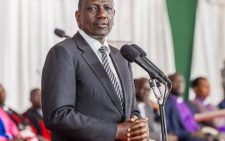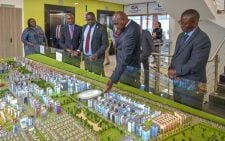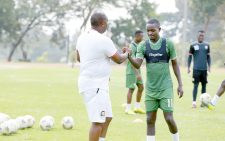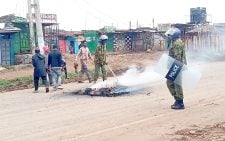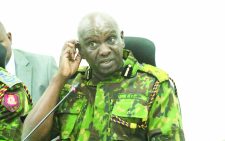Ruto narrates State success stories to mark Madaraka Day
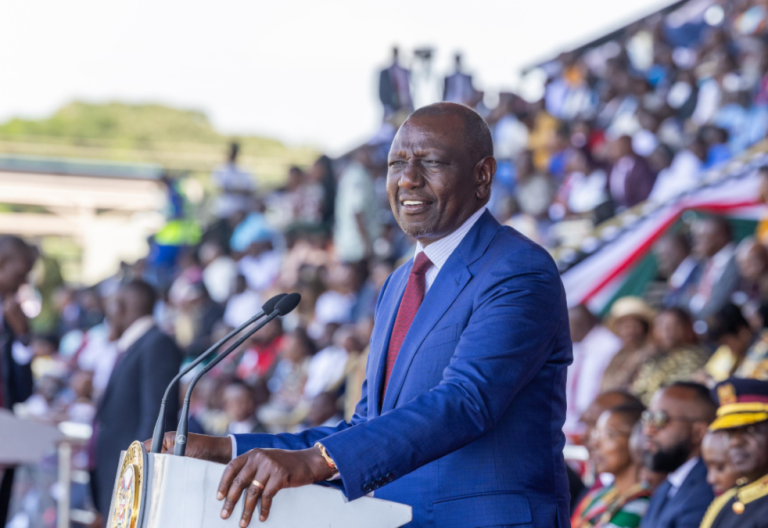
President William Ruto presided over the 62nd Madaraka Day celebrations in Homa Bay County, highlighting sweeping socio-economic reforms under his administration and calling on Kenyans to embrace change with confidence, courage, and unity.
Speaking at the Raila Odinga Stadium on Sunday, June 1, 2025, Ruto celebrated Kenya’s journey since attaining internal self-rule in 1963, affirming that the nation has made significant strides despite past adversity.
“Our forefathers knew, as we do, that we, the people, are the foundation, the pillars and the engine of this nation, and that only we can do the work of building the Kenya we want. More critically, we understand keenly that this country is our home and we have no other,” he stated.
The president noted that the country’s biggest problem has always been on the implementation and execution side, stating that Kenyans must possess the self-belief to approach tasks boldly and confidently.
Ruto noted that since taking office in 2022, his administration has delivered a strong economic performance, driven by the Bottom-Up Economic Transformation Agenda (BETA).
He reported that Kenya’s economy grew at an average of five per cent, outpacing global and regional averages, citing the strengthening of the Kenyan shilling, falling inflation (now at 3.8 per cent), and growing foreign reserves as evidence of stabilising fundamentals.
“Kenya is now the largest economy in our region and the sixth largest on the continent,” Ruto announced.
Ruto also praised the 20 per cent appreciation of the shilling against the US dollar and a drop in the Central Bank Rate from 13 per cent to 10 per cent, which he said is stimulating private sector growth.
The Head of State listed the affordable housing programme, which he said delivered over 11,000 units and created over 250,000 jobs.
He also shared moving stories of beneficiaries, from Nairobi to Homa Bay, including Jerusha Muthoni, a mother of three and second-hand clothes trader, and Kennedy Odede, a boda-boda rider.
Gradual repayments
“These stories stand as a powerful testament to the transformative promise of bottom-up empowerment,” he said.
The president also reported significant progress under the TaifaCare programme launched in October 2024.
With over 23 million Kenyans now registered under the Social Health Authority (SHA), Ruto declared that universal health care was no longer a dream.
“For the first time in Kenya’s history, citizens can access free emergency services in all public facilities,” he said.
He introduced LipaSHA Polepole, a flexible contribution system that allows informal sector workers to pay insurance premiums in small, manageable instalments, ensuring sustained coverage.
President Ruto detailed progress in reviving key agricultural sectors through fertiliser subsidies and pricing reforms. Milk, tea, coffee, and sugarcane farmers have all seen significant income gains, he said.
Notably, sugar production rose by 70 per cent in 2024, and tea earnings jumped from Ksh138 billion to Ksh215 billion within two years.
He cited competitive leasing of ageing state-run mills as a strategy to improve efficiency and safeguard farmers’ livelihoods.
“We are not selling these factories; they remain public property. But we’re bringing in private players to run them efficiently,” he clarified.
The president highlighted what he called the most transformational shift in education in six decades.
According to Ruto, Kenya’s education system is now fully competence-based, backed by massive investments in teacher recruitment and infrastructure.
Over 76,000 new teachers have been hired, he added, with 23,000 classrooms constructed.
The president also introduced the NYOTA (National Youth Opportunity Towards Advancement) project, a Ksh20 billion initiative in partnership with the World Bank that aims to empower over 800,000 youth with training, jobs, and entrepreneurship opportunities.
Opposition leader Raila Odinga used this year’s Madaraka Day celebrations to urge Ruto to strengthen devolution and compensate families affected by past political unrest, calling it a necessary step toward national healing and development.
Raila praised the principle of devolved governance as one of the country’s most transformative constitutional achievements but warned that it remains under threat due to inadequate funding and attempts to revive the defunct provincial administration.
“Importantly, Your Excellency, it is a testament that devolution works and can work even better if it is empowered,” Raila said, insisting that counties should be given sufficient resources so that they can be able to provide services to the people.
Odinga recalled that the idea of devolution was first introduced in the 1963 independence constitution under the name “Majimbo,” and later revived through the 2010 Constitution following years of centralisation.
He emphasised that for devolution to succeed, the national government must not only increase county allocations but also delegate some national functions to counties.
Raila called on Parliament to implement an agreement that would allocate Ksh450 billion to the counties in the 2025/2026 financial year.
He also cautioned the government against reintroducing the provincial administration system, terming it a relic of colonialism that undermines the authority of elected county governments.
“Do not resurrect provincial administration,” he warned. “We want to see that governors get sufficient resources to do their work.”
Slovenia’s President Nataša Pirc Musar was the chief guest during the event, attended by thousands of people.

